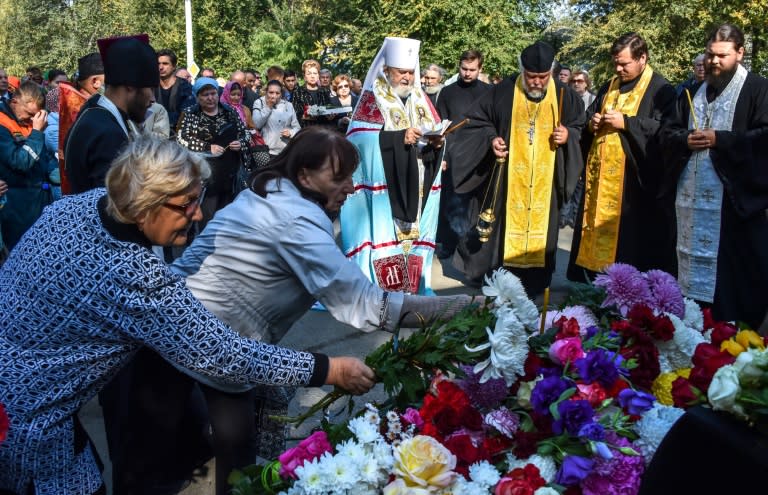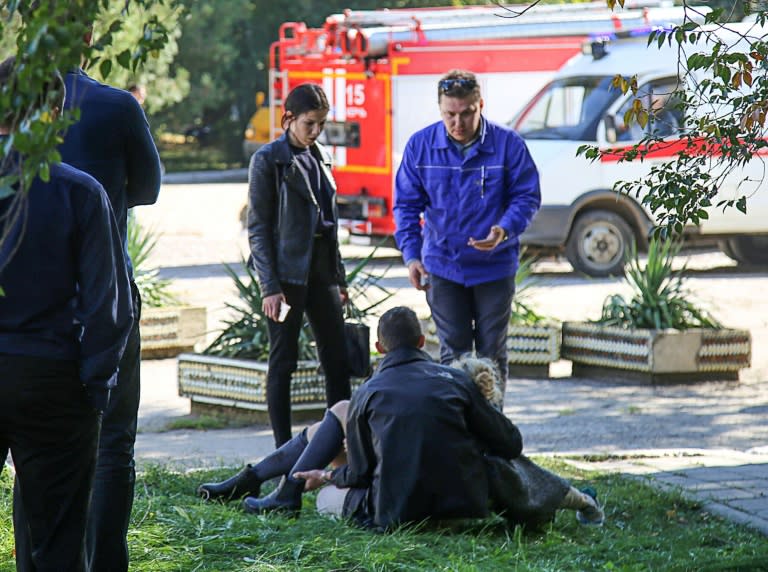In Kerch, locals fear deadly college attack linked to 'terrorism'
Residents of the Crimean city of Kerch, where 20 were killed and some 50 injured in an attack on a technical college, on Friday widely expressed doubts over claims by investigators that the teenage gunman acted alone. "It's impossible that there was only one person. It was a terrorist attack. They say it was a mass shooting but I don't believe it," said Sergei Vagin, holding two red roses to lay at a memorial ceremony in the city on Friday. He said he believes that the 18-year-old shooter Vladislav Roslyakov must have had accomplices in order to methodically attack so many of the students and teachers after saying he hated them for humiliating him. Vagin, a 23-year-old construction worker, was speaking as a funeral march was played for the victims of the worst school shooting in Russia's history, on territory annexed from Ukraine. Over the course of two hours on Friday, thousands of Kerch residents filed past the coffins containing the remains of the first 17 victims to be buried. Conspiracy theories were widely put forward by the mourners. "I think they are hiding something from us. It's hard to believe that this boy was able to organise it all alone," said Oleg Zhmaka, the principal of a sports school, citing the amount of money Roslyakov must have spent to prepare for the massacre. Russian media estimated that Roslyakov spent 39,000 rubles ($600), including almost 15,000 rubles to acquire a gun licence. These are considerable sums for a teenager who lived with his mother, a hospital orderly, in a region where the annual monthly wage is 26,300 rubles according to the Russian government statistics agency. While Russian President Vladimir Putin blamed the attack on "globalisation," implicitly pointing the finger at the United States, Crimean leader Sergei Aksyonov seemed to lend credence to the popular view that "this scoundrel could not have carried out the preparatory measures alone." - 'It was so quiet here' - The distrust of the official version derives from the fact that Crimea, annexed in March 2014 after a referendum that the international community views as illegitimate, differs from Russia's other regions. While Crimea did not suffer the type of separatist armed conflict that broke out in eastern Ukraine, the annexation was not a seamless transition. For Kerch, a city of 150,000 inhabitants in a strategic position in the extreme east of the peninsula, annexation led to the hugely costly construction of a bridge connecting it to the Russian mainland, opened by Putin in May, which shook up the previously sleepy city and has raised new fears about security. "We'll have to increase security now that the bridge is here," said one of the mourners, 58-year-old Pavel Yesin, who works for the local weather service. "It was so quiet here but now that's starting to change." The 18-kilometre-long (11-mile) bridge is impossible to miss, its arches built to allow cargo ships to pass through to Russian and Ukrainian ports in the Sea of Azov. The sea lane, shared by Ukraine and Russia, has recently sparked a row between the countries, with Kiev accusing Russian coastguards of causing long delays for ships heading to its ports. Amid such tensions, immediately after the college attack, numerous Russian officials suggested Ukraine could be implicated. Some Russian media pointed the finger at Crimean Tatars, the indigenous Muslim ethnic group that largely opposed Russian annexation and has come under a harsh crackdown from the new authorities. "It's a tragedy that I could never have imagined, even with this change of atmosphere," said Fyodor Mostepanov, a 68-year-old retired manual worker who has lived his whole life in Kerch and calls the attack a "personal tragedy." What has changed is the "terrorism everywhere," he added. Sports school principal Zhmaka agreed, saying "this is a global problem of terrorism, it's not the problem (only) of Russia or Crimea." "There are special forces in front of every school. But that only points out the rotting abscess; problems with security." Close to the central Lenin Square, as mourning residents gathered, One of them, Natalia Odegova, said she wanted to keep a rational view. "It's very quiet here," the pensioner said. "It's always been like that. What happened didn't happen because this is Crimea. It's because something happened in the head of a young man."




